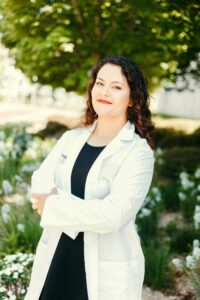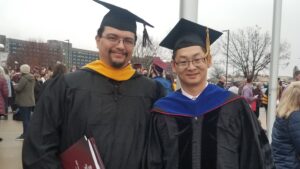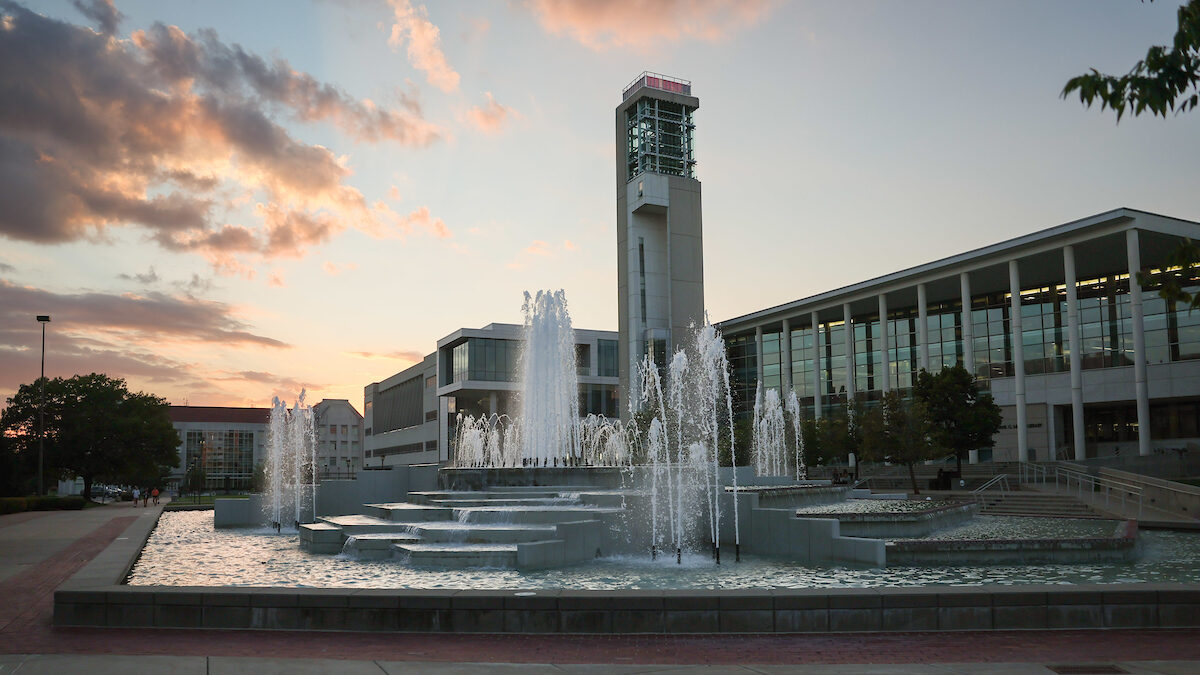Completing your thesis is a celebration in itself.
But being selected for Missouri State University’s Distinguished Thesis Award is an even bigger cause for celebration.
The award has four categories:
- Biological/life sciences.
- Humanities.
- Social sciences.
- Mathematics, physical sciences and engineering.
Recently, two CNAS alumni were selected for the award. Sophia Antonopoulos received the award for the biological/life sciences category and Anthony Harris received the award in the category of mathematics, physical sciences and engineering.
Sophia Antonopoulos
Stockton, Missouri
Recently graduated with an M.S. in biology, Antonopoulos’ work in Dr. Paul Durham’s lab investigates natural migraine relief methods.

“My thesis project focused on a nutraceutical called grape seed extract (GSE),” she said. “Nutraceuticals are natural alternatives to pharmaceuticals, with little to no negative side effects. The lab I work in has studied nutraceutical compounds like GSE, bone broth and cacao in the past.”
This lab – the Center for Biomedical and Life Sciences – has previously published research regarding how GSE affects those with common chronic illnesses.
“My thesis involved looking at possible cellular mechanisms of how GSE acts as a beneficial anti-inflammatory in chronic orofacial pain diseases, like migraine and TMJ.”
Her findings found GSE increases production and utilization of the neurotransmitter GABA to stop the vasodilatory molecule CGRP.
“Without going too far in depth, think of GABA as the good guy that decreases pain, and CGRP as the bad guy that causes the sensation of painful feelings,” Antonopoulos said. “I found that GSE increases receptors related to GABA. This partially explains how GSE can help decrease pain in the case of a migraine or TMJ.”
What’s next
In addition to her thesis, Antonopoulos is involved in additional research projects in the very same lab.
“I am still working in the same lab I did my thesis project and undergraduate work in, and I plan to stay here for the time being.”
Antonopoulos doesn’t see herself doing anything other than research in the near future.
“I hope to continue to work in labs where I am passionate, happy and enjoying the research and work that I’m involved in,” she said. “I’d like to explore a variety of research fields throughout my career.”
This award was the cherry on top of finishing her thesis – and her graduate degree.
“Receiving this award is an honor and has created a very satisfying and celebratory end to my time as a graduate student,” Antonopoulos said. “It makes me feel like the years of hard work I put into my time at MSU has been recognized and applauded.”
Giving thanks
Getting this far wouldn’t have been possible for Antonopoulos without some special people.
“Dr. Durham is the reason that I was able complete my thesis project, as well as continue with various projects in the lab,” she said. “He gave me the opportunity to start working in his lab at the beginning of my freshman year of college. Through his mentorship, I have been able to thrive in the laboratory setting.”
Durham sees big things for Antonopoulos.
“Sophia is one of the brightest and most highly motivated students that I have had the pleasure of mentoring,” Durham said. “Her future as a scientist is very promising.”
Anthony Harris
Cassville, Missouri
With a M.S. in computer science and a data science graduate certificate, Harris has been working with a special type of system: video games.
“The use of reinforcement learning to solve complex problems with no ‘correct’ solution is common practice in the field of single-agent systems. It has been shown to yield super-human results in systems such as chess, shogi and Go,” Harris said.
“In short, my research focuses on using deep reinforcement learning to train a machine to play StarCraft II in various micromanagement scenarios.”
Historically, reinforcement learning has been unsuccessful among multi-agent systems. These are systems with multiple decision-making agents that interact in a shared environment to achieve common or conflicting goals.

“My work helps bridge the gap between traditional reinforcement learning and multi-agent reinforcement learning by introducing a novel means of multi-agent environmental interpretation,” Harris said. “This allows for agents in the system to better understand the state of the system as a whole, without the need for perfect or complete state information.”
Harris’s out-of-the-box thinking has made a big difference.
“Unlike many researchers before me, my work accomplishes such improvements while using fine-grained, per-unit control, rather than with macro-level, per-team control,” Harris said. “This distinction is important, as per-unit control is more easily comparable to real-world multi-agent systems such as self-driving cars.”
His work has been peer reviewed and acknowledged by top researchers in the field of reinforcement learning and multi-agent reinforcement learning. It was showcased in the 3rd IEEE Conference on Games.
Looking ahead
Harris currently works at O’Reilly Auto Parts as a data scientist and has big goals for his future.
“I’m aiming to become a top-of-the-line machine learning engineer and researcher,” he said. “I want to keep growing and learning along with the best of the best in the hopes of one day counting myself among them.”
Receiving this award and the support from faculty has helped shape him into the data scientist he is today, and what he will be in the future.
“I’m flattered that I was chosen to receive this award,” he said. “I would like to thank Dr. Razib Iqbal for setting me on the path of graduate research, and Dr. Siming Liu for his tremendous guidance and insights throughout my graduate studies. I also extend my thanks to Dr. Jamil Saquer and Dr. Anthony Clark for serving on my thesis committee in addition to Dr. Liu and Dr. Iqbal.”

